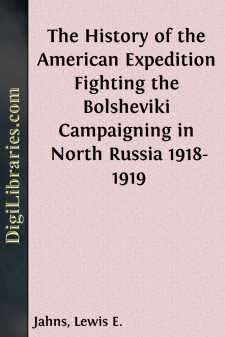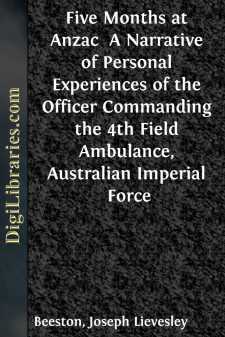Biography & Autobiography
- Adventurers & Explorers 15
- Artists, Architects, Photographers 16
- Business 2
- Composers & Musicians 14
- Criminals & Outlaws 5
- Editors, Journalists, Publishers 6
- Educators 1
- Entertainment & Performing Arts 3
- General 74
- Health, Exercise & Fitness 1
- Historians 3
- Historical 83
- Law Enforcement 1
- Lawyers & Judges 3
- Literary 147
- Medical 7
- Military 48
- Naturalists, Gardeners, Environmentalists 8
- Personal Memoirs & Diaries 227
- Philosophers 3
- Political 9
- Presidents & Heads of State 38
- Religious 38
- Rich & Famous 27
- Scientists 13
- Women 31
Biography & Autobiography Books
Sort by:
by:
Lewis E. Jahns
[Transcriber's Notes] Here are the definitions of several unfamiliar (to me) words. batmen Soldier assigned to an officer as a servant. batushka Village priest. drosky Cart felcher Second-rate medical student or anyone with some medical knowledge. hors de combat Out of the fight; disabled; not able to fight. junker Aristocratic Prussian landholder devoted to militarism and ...
more...
by:
Francis Buckley
WHEN IT BEGAN Before the war I was living in London, with chambers at Lincoln's Inn. I was not surprised when the trouble started. Ever since 1904 it was reasonably clear to me that our country would have to fight the Germans or go under. The days before we declared war on Germany were spent in London. During the last few of them it was as though a terrible thunderstorm was hanging overhead, ready...
more...
CAPTURED It was November 9th, 1916. I lay in a state of luxurious semi-consciousness pondering contentedly over things in general, transforming utter impossibilities into plausible possibilities, wondering lazily the while if I were asleep. Presently, to my disgust an indefinable, yet persistent “something” came into being, almost threatening to dispel the drowsy mist then pervading my brain. The...
more...
FOURTH FIELD AMBULANCE Shortly after the outbreak of War—after the first contingent had been mobilised, and while they were undergoing training—it became evident that it would be necessary to raise another force to proceed on the heels of the first. Three Infantry Brigades with their Ambulances had already been formed; orders for a fourth were now issued, and naturally the Ambulance would be...
more...
by:
Anonymous
INTRODUCTION I have been asked to write an Introduction to these letters; and I do so, in spite of the fact that M. Chevrillon has already written one, because they are stranger to me, an Englishman, than they could be to him a Frenchman; and it seems worth while to warn other English readers of this strangeness. But I would warn them of it only by way of a recommendation. We all hope that after the...
more...
by:
Innes Logan
CHAPTER I MUSTERING MEN Those gaunt unlovely buildings The War Office built Maryhill Barracks, Glasgow, to look exactly like a gaol, but these gaunt unlovely buildings, packed beyond endurance with men of the new army, were at least in some way in touch with what was happening elsewhere. Even in that first month of the war it seemed callous to be breathing the sweet, clear air of Braemar, or to let...
more...
CHAPTER I Just where the white man's continent pushes the tip of its horn among the eastern lands there is a black man's land half as large as Mexico that is administered by the government of Australia. New Guinea has all the romance and lure of unexplored regions. It is a country of nature's wonders, a treasure-chest with the lid yet to be raised by some intrepid discoverer. There are...
more...
I. BEFORE THE ATTACK. By means of a lorry lift from railhead, and a horse borrowed from the Divisional Ammunition Column, I found Brigade Headquarters in a village that the Germans had occupied before their retreat in the spring of 1917. The huge, red-faced, grey-haired adjutant, best of ex-ranker officers, welcomed me on the farmhouse steps with a hard handshake and a bellowing "Cheerio!"...
more...
by:
G. P. Cuttriss
INTRODUCTION At the outbreak of the World War in August, 1914, the Australian as a soldier was an unknown quantity. It is quite true that in the previous campaigns in the Soudan and in South Africa, Australia had been represented, and that a sprinkling of native-born Australians had taken service in the Imperial armies. The performances of these pioneers of Australia in arms were creditable, and the...
more...
PREFACE On April 22nd, 1915, the writer, in company with Major Rankin, saw the Germans launch their first gas attack near St. Julien upon the section of the line held by the French colonial troops and the first Canadian division. This book was written primarily for the purpose of recording this as well as some of the other experiences of the first Canadian division as seen from the unusual angle of a...
more...











